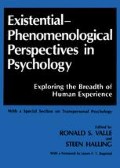Abstract
That it is even possible to take a phenomenological approach to child development rests upon a radical empirical fact: To be human means that one is or was once a child. The experience of being or having been a child is known to every person as an essential condition of his or her existence. This knowledge is accessible either directly to children who are currently living through their own developing childhoods or indirectly to adults who recollect childhood experiences out of the fabric of their already developed life-worlds. It is the radicality of this “world fact” (Wild, 1959) concerning childhood that makes possible a phenomenological approach to child development. For one cannot make sense of the world of a developing child without existential grounding in the experience of living or having lived as a child. And one cannot hope to communicate with others about the meaning of the developing child’s world unless those others, too, are or have been children.
And the children in the apple-tree
Not known, because not looked for...
—T. S. Eliot
Access this chapter
Tax calculation will be finalised at checkout
Purchases are for personal use only
Preview
Unable to display preview. Download preview PDF.
References
Aries, P. (1962). Centuries of childhood. New York: Random House.
Becker, E. (1971). The birth and death of meaning. New York: The Free Press.
Briod, M. (1986). The child’s sense of time and the clock. Phenomenology & Pedagogy 4(1), 9–19.
Coles, R. (1986). The moral life of children. Boston: Atlantic Monthly Press.
Dennison, G. (1969). The lives of children. New York: Random House.
Donaldson, M. (1978). Children’s minds. New York: W. W. Norton.
Eliot, T. S. (1943). Four quartets. New York: Harcourt, Brace, and World.
Erikson, E. H. (1980). Identity and the life cycle. New York: W. W. Norton.
Giorgi, A. (1983). Concerning the possibility of phenomenological psychological research. Journal of Phenomenological Psychology 14, 129–169.
Heidegger, M. (1962). Being and time. London: SCM Press.
Husserl, E. (1962). Die krisis der eupaischen Wissenschaften und die transzendentale phanomenologie (2nd ed.). The Hague: M. Nijhoff.
Kagan, J. (1984). The nature of the child. New York: Basic.
Knowles, R. (1986). Human development and human possibility: Erikson in the light of Heidegger. Lanham, MD: University Press of America.
Koestler, A. (1974). Selections from arrow in the blue. In J. I. Milgram and R. P. Hawkins (Eds.), Childhood revisited (pp. 170–181). New York: Macmillan.
Koestler, A. (1978). Janus. New York: Random House.
Kohl, H. (1984). Growing minds. New York: Harper & Row.
Kohlberg, L. (1969). Stage and sequence: The cognitive-developmental approach to socialization. In D. Goslin (Ed.), Handbook of socialization theory and research (pp. 347–480). Chicago: Rand McNally.
Kotre, J. (1984). Outliving the self. Baltimore: Johns Hopkins University Press.
Lippitz, W. (1983). The child’s understanding of time. Phenomenology & Pedagogy 2(3), 172–180.
Lippitz, W. (1986). Understanding children, communicating with children: Approaches to the child within us, before us, and with us. Phenomenology & Pedagogy 4(3), 56–65.
Mathews, G. B. (1980). Philosophy and the young child. Cambridge, MA: Harvard University Press.
Mathews, G. B. (1984). Dialogues with children. Cambridge, MA: Harvard University Press.
McCullough, D. W. (1987). American childhoods: An anthology. Boston: Little, Brown.
Merleau-Ponty, M. (1962). Phenomenology of perception (C. Smith, Trans.). New York: Humanities.
Merleau-Ponty, M. (1964). The child’s relations with others (W. Cobb, Trans.). The primacy of perception (pp. 96–155). Evanston: Northwestern University Press.
Merleau-Ponty, M. (1973). Consciousness and the acquisition of language. Evanston: Northwestern University Press.
Milgram, J. I., and Hawkins, R. P. (Eds.) (1974). Childhood revisited. New York: Macmillan.
Miller, A. (1981). The drama of the gifted child. New York: Basic Books.
Paley, V. B. (1981). Wally’s stories: Conversations in the kindergarten. Cambridge, MA: Harvard University Press.
Piaget, J. (1950). The psychology of intelligence. London: Routledge & Kegan Paul.
Pitcher, E. G., and Prelinger, E. (1963). Children tell stories. New York: International Universities Press.
Polakow-Suransky, V. (1982). The erosion of childhood. Chicago: University of Chicago Press.
Polakow-Suransky, V. (1984). The social landscape of play: The child as researcher. Paper presented to The American Education Research Association in New Orleans, April 23, 1984.
Prescott, M. P., & Valle, R. S. (1978). An existential-phenomenological look at cognitive-development theory and research. In R. S. Valle and M. King (Eds.), Existential-phenomenological alternatives for psychology (pp. 153–165). New York: Oxford University Press.
Schrag, C.O. (1980). Radical reflection and the origin of the human sciences. W. Lafayette, IN: Purdue University Press.
Sutton-Smith, B. (1980). Folkstories of children. Philadelphia: University of Pennsylvania Press.
van den Berg, J. H. (1961). The changing nature of man. New York: W. W. Norton.
Wild, J. (1959). Human freedom and the social order. Durham: Duke University Press.
Author information
Authors and Affiliations
Editor information
Editors and Affiliations
Rights and permissions
Copyright information
© 1989 Plenum Press, New York
About this chapter
Cite this chapter
Briod, M. (1989). A Phenomenological Approach to Child Development. In: Valle, R.S., Halling, S. (eds) Existential-Phenomenological Perspectives in Psychology. Springer, Boston, MA. https://doi.org/10.1007/978-1-4615-6989-3_7
Download citation
DOI: https://doi.org/10.1007/978-1-4615-6989-3_7
Publisher Name: Springer, Boston, MA
Print ISBN: 978-0-306-43044-2
Online ISBN: 978-1-4615-6989-3
eBook Packages: Springer Book Archive

